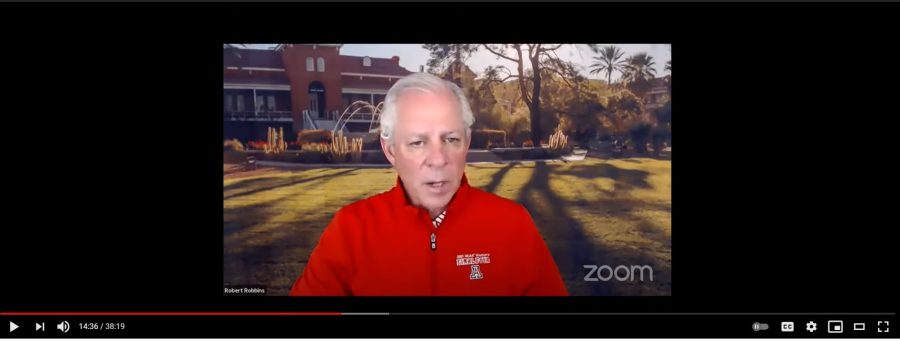The Arizona Board of Regents held their 29th annual tuition hearing Tuesday, April 6. The meeting started off with the three presidents of the Arizona universities, Northern Arizona University, Arizona State University and University of Arizona discussing what they plan to ask the board to approve and/or consider for tuition.
ASU President Michael Crow had the floor first and discussed his tuition proposal from the academic year of 2021-22.
“Our proposal is built around our tuition model. The ASU tuition model is one that is built on three basic concepts. One concept is modest tuition with high financial aid. The second concept is financial aid available to everyone that needs it in the form of grants … . And the third … is maintain undergraduate in-state tuition increases to under 3%,” Crow stated.
Crow explained that this year they are asking for no tuition increase for any ASU students including undergraduates, graduates, in-state, out-of-state or international. He added that they “are recommending small fee adjustments for particular graduate degree programs and one fee correction for students in the Herberger Institute for Design and the Arts.”
NAU President Rita Cheng stated that NAU is proposing to not increase undergraduate tuition or proposing any mandatory fee increases. NAU is continuing the Pledge guaranteed tuition program for its 13th year in a row.
“These various components of our tuition strategy are not a sustainable model. As Dr. Crow has indicated, a 0% increase in tuition is not sustainable ongoing, but it is a proposal that is right for this time as we recognize the many challenges ahead,” Cheng stated.
Cheng added that “the Pledge program holds total tuition and mandatory fees for incoming resident undergraduate students on the Flagstaff campus at $11,896 for the second tuition setting cycle.”
Cheng explained that graduate tuition is below the undergraduate tuition rate, and they recommended an adjustment to recalibrate the graduate and undergraduate tuition rates. Graduate tuition in their proposal will increase 5% for all campus-based students.
“All other tuition rates for undergraduate and graduate students will be held flat including no change in online rates,” Cheng said.
The NAU proposal also includes “no mandatory fee increases for the upcoming academic year and continues efforts to reduce class fees. One new undergraduate program fee is proposed to eliminate fees paid by students in the undergraduate dental hygiene program,” Cheng said.
“Housing [fees] has been adjusted to better stratify the amenities received into housing tiers based on types of residence halls,” Cheng said.
Their proposal is to reduce the number of rental rates from 17 to five. NAU proposes a 4.45 average increase in the 2021 and 2022 residence hall rates. NAU also proposed a 2% increase in the 2021 and 2022 meal plans.
Joe Carter, a student from NAU, expressed his approval for most of the proposal.
“I serve as the president of [the Associated Students of NAU] and I am here to offer its support for the lack of increases in undergraduate tuition and fees as well as support for the new housing structure for the 2021 and 2022 academic year,” Carter said.
Carter also expressed his concern that the increase in housing rates proposed could hardships for current students and families who aren’t seeing an increase in income during the pandemic.
RELATED: New UA tuition and fees proposal released, Honors College proposes significant program fee increase
UA President Dr. Robert C. Robbins was next to discuss his proposal. He recommended a 0% increase in tuition and mandatory fees in 2021 and 2022 for 99% of continuing undergraduate students.
Robbins stated that the UA proposes that “undergraduate guaranteed resident tuition will have a 0% increase. Undergraduate guaranteed non-resident tuition will increase 1.4%. Undergraduate non-guaranteed tuition will increase 1.4%. Graduate resident tuition will increase 1.4%. Graduate non-resident tuition will increase 0.7%.”
“The College of Medicine — Tucson tuition for Arizona residents will increase 3% and non-resident will increase 1% for first-year students. Second through fourth-year students, whether resident or non-resident, will see no increase … . The College of Medicine — Phoenix tuition for Arizona residents will increase 3% for first through fourth-year students, and non-resident tuition will increase 1% for first through fourth-year students … . College of Veterinary Medicine resident and non-resident student tuition will increase 2% for first-year students while the second-year cohort will see no increase,” Robbins said.
Robbins explained that “mandatory fees will not increase … with the exception of the recreation center program fee which may increase annually based on the consumer price index and the Arizona financial aid trust fee … .”
UA “students also proposed a new sustainability fee that helps put the power and initiative of campus sustainability in the hands of students. Incoming undergraduate students … will be guaranteed the new tuition rate for four consecutive years — this includes mandatory fees. Incoming graduate students … will be guaranteed the new mandatory fee rates for four consecutive years as well,” Robbins said.
“We arrived at this proposal through a process that involved student leaders and drew upon their perspective and valuable input. Student leaders from the Associated Students of the University of Arizona, Associated Students of the University of Arizona South and the graduate and professional student council met with senior leaders several times to discuss this proposal,” Robbins stated.
Samantha Wallace, a UA student, discussed the proposed sustainability fee. She explained that students are aware of the issue of climate change, but that they are overwhelmed by the magnitude of the problem.
“Students recognize that climate change and other sustainability related issues are the defining challenge of our generation,” Wallace stated.
Wallace conducted a survey that found that “95% of students would support or possibly support a student fee that would fund sustainable initiatives on campus.”
Follow Jillian Bartsch on Twitter









